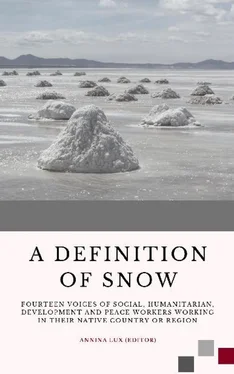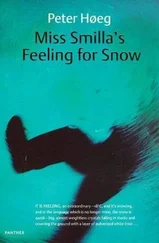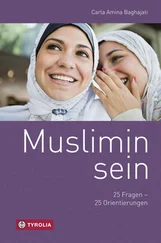With this came a second realisation: that the stories of those dedicating their lives to working or volunteering in their own country in social, humanitarian, development and peace-related fields are vastly unavailable in the Western world 1. Narratives in the media, in NGO (non-governmental organisation) reports and in general discussions and publications often neglect the voices of those volunteers and staff members from the country in question. And – as many of those I talked to told me – there are no easily accessible, reliable ways of hearing the voices of people working in their own countries. While you can find many narratives by Western foreign aid workers in bookshops, there are none from their national counterparts. Although these accounts by foreign aid workers are often important and valid, they are just that – the stories of foreigners spending a relatively limited period of time in a country before (usually) moving on to the next project.
Particularly worrying is the trend of young ‘gap year’ and ‘voluntourism’ travellers writing autobiographies in their early twenties after spending anything between two weeks and two years volunteering in a remote corner of the earth. Foreign aid workers (including myself) and other volunteers can give valuable accounts of their experiences. But what they can’t do is give a full picture, if the stories of their national counterparts are still missing from the narrative. The same gap can be found in media reporting. Coming back from Bolivia, I was surprised at how little reporting there was on the political situation in the country, even at the height of a series of scandals surrounding the country’s political elite shortly after the national elections. The same became evident with the crises in South Sudan and Venezuela a short time later. The International Federation of the Red Cross and Red Crescent Societies (IFRC) started a campaign a couple of years ago called ‘Turning up the Volume on Silent Disasters’. Its aim was to raise awareness of the 91% of disasters worldwide that go unnoticed, unreported in TV and newspapers. And of course, there are an incredible number of dedicated people trying to alleviate the effects of such disasters in their home countries on a daily basis, yet often their stories go as unnoticed as the disasters themselves.
Speaking to my friends and former colleagues in Bolivia and discussing the problem with friends from around the world, a third realisation followed: not only was there no way to access the stories of these individuals in the Western world, but there was also no way for these individuals to tell their stories in the first place. This is when the idea of VOICE: Voices of Individuals Conveying Experiences, was born – a project to fill that void and to project the voices of those tirelessly working in their native country or region, to provide an alternative or supplement to dominant narratives. In February 2016, Project VOICE began, with just one writer from Bolivia. A little more than a year later, VOICE had a team of ten people, from six different countries, and was working with writers from all over the world. Their stories are very different – they convey a wide range of experiences and emotions – but they are all thought-provoking, honest, touching, inspiring and encouraging. None of the individuals telling their stories in this collection is a professional writer – some of them have never written a story in their lives. Yet, in their own words, each and every one of them gives powerful insights into their work, their dedication, their challenges, the importance and urgency of progress in their field, their hopes, wishes and goals, their beliefs, and their personal experiences. And as such, their collective voices are perfect definitions of snow.
Notes from a VOICE Writer
Sheila Chepkoech
Sheila is the VOICE regional contact for Africa, and also shares her story as a contributor in ‘Another Side of the Story’.
While pursuing my master’s in Paris, a friend of mine from Germany and I used to joke that Africa is a country and all the 54 countries are just villages. There was an element of truth deeply rooted in this joke, which stemmed from people’s perceptions of Africa and how the continent is projected in the mainstream media. This joke would ring true in many instances during my interactions with people from different countries, mostly Western countries, while in Paris. For instance, when someone would narrate to me their visit to Senegal with an expectation that I would completely understand what they were talking about, despite the fact that Senegal and Kenya, where I am from, are not only thousands of miles apart but have different cultures and history. It would ring true when at an event where I was the only African, the master of ceremonies led the crowd in singing the theme song from the animation The Lion King while joyfully looking at me, expecting that I would relate to it or feel at home. It would also ring true in class when fellow students or lecturers would make blanket sweeping statements about ‘Africa’, as if all the 54 countries were exactly the same. Our joke, however, never used to end at that: it was always an opportunity for us to deliberate on the frustrations and the ignorance that was constantly being perpetuated with this kind of world view.
When the idea of VOICE was pitched to me, I was not only excited but also delighted to be among the contributors. This is because, to me, VOICE provides an opportunity for citizens of developing countries, working in their own countries, to present their perspectives. More often than not, audiences from around the world are presented with the notion that humanitarian or NGO work is mainly done by people from developed countries who go to work in developing countries. What is constantly missing is the perspective of nationals working within their own communities to address the challenges facing their societies. Once in a while their story is told, but usually by a third party, when you see reporters interviewing them. VOICE therefore is a unique project. It gives people an opportunity to tell their own stories, as seen through their own eyes, in the best way possible. It opens up the world the writers live in, inviting the entire world to come and share in their experiences. Giving a first-hand account of their experiences, the writers debunk myths, they challenge stereotypes and they give a much clearer perspective on their work. Moreover, in most of the stories, readers get an opportunity to learn about beneficiaries of various initiatives, from the point of view of their fellow citizens.
As a writer, VOICE has enabled me to revisit my experiences and the work I have done, and still continue to do, to impact my world – and what a refreshing experience writing about it has been! I have come to appreciate the value that has been added to my life by the people I have worked with and the experiences I have been through. The most exciting part of this journey, importantly, is the opportunity to share all these lessons and experiences with the world at large. As I write for VOICE, I am constantly reminded of the bigger picture, the purpose that this project aims to fulfil of debunking myths and creating greater understanding, and this brings me a lot of satisfaction. I believe it gives the same satisfaction to my fellow writers. My hope is that this will be the start of an initiative that will challenge long-held stereotypes and uninformed assumptions that we continue to face as citizens of developing countries. As people from different corners of the world read these stories, our hope is that a clearer understanding will be achieved by our readers. We hope that these stories will compel readers to take the initiative to learn more about the countries that writers come from, and perhaps even visit these countries one day.
Читать дальше




![Serg Aill&Lex Lux - Идефикс. Жажда силы [СИ]](/books/422633/serg-aill-lex-lux-idefiks-zhazhda-sily-si-thumb.webp)







